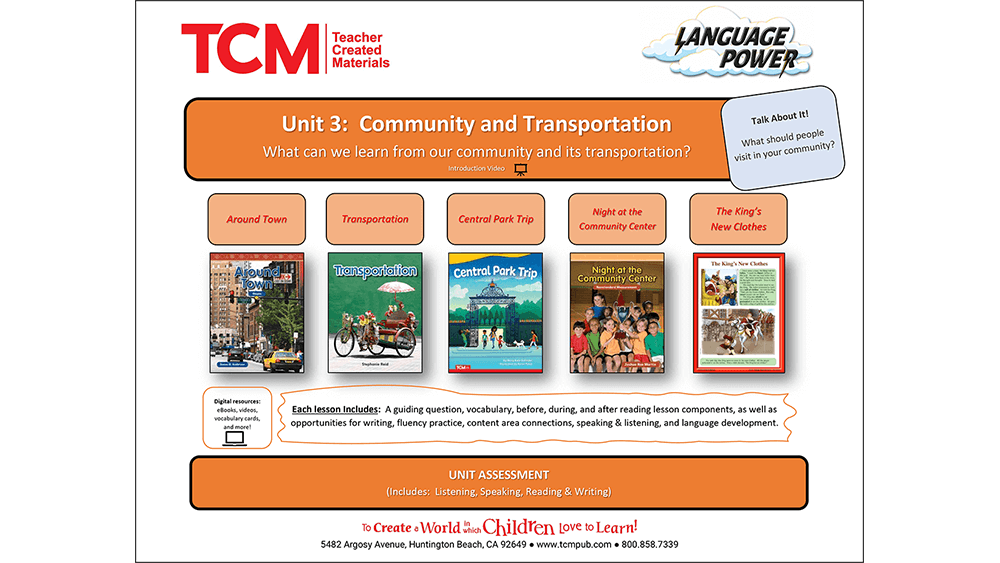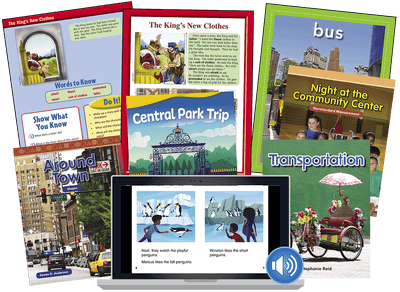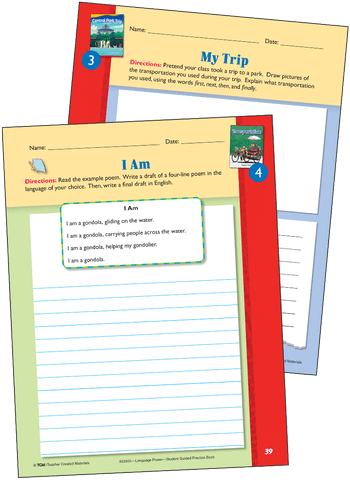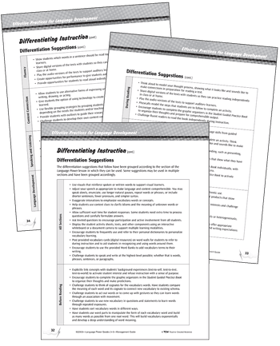8 Keys to Language Development
In this article you will find eight keys to language development which also form the pedagogical backbone for Language Power, 2nd Edition. Take a closer look at each of the keys and the ways that the program supports language development with examples and visuals. Plus, watch an on-demand webinar offering ways to engage language learners in rich experiences that develop language skills in all four language domains: listening, speaking, reading, and writing.
Language Development
Language development takes time. It requires thoughtful instruction, decisions based on student need, and an approach that best meets the needs of students. There are many keys to effective language development. Each of the eight keys featured in this article is supported by the Language Power, 2nd Edition. Examples are provided to demonstrate ways that the program will help with language development.

Key #1: Teaching Thematically
One key of effective language development is teaching thematically or in a topic-based way. English learners benefit from this approach to learning as they are able to make connections and see how learning is connected across the curriculum. With a thematic or topic-based approach, English learners have an opportunity to use academic language, and experience the varied contexts in which to use language appropriately. Students are able to make connections and see how learning is interrelated. When students have access to multiple learning activities focused on one topic or theme, they develop more knowledge, vocabulary, and understanding. This provides a solid foundation to build language skills in listening, speaking, reading, and writing.
The text sets in Language Power, 2nd Edition provide a range of reading levels to meet student needs. The books and text cards focus on a variety of high-interest topics with diverse text types and genres. Let’s look at a few of the themes or topics in each grade band of Language Power, 2nd Edition:
|
K-2 |
3-5 |
6-8 |
|
My Community, School, Play and Exercise |
Weather, Communities and Transportation, Plants, The United States |
Inventing & Engineering, Environmental Science, Sports, Civics & Government |
See a detailed example of a Language Power, 2nd Edition unit, Communities and Transportation.
 Posing Essential & Guiding Questions
Posing Essential & Guiding Questions

At the beginning of learning, posing an essential question allows for students to focus their learning on a narrow topic, learning with purpose to respond to an essential question. The key to language learning of essential and guiding questions is aligned with the inquiry-based approach, which accomplishes the goal of creating an umbrella of inquiry that will lead students to discover knowledge and information organically. Guiding questions provide multilingual learners opportunities to formulate responses to the answers to the essential question in a variety of ways.
In Language Power, the 3–5th grade unit about Community and Transportation asks the essential question: What can we learn from our community and its transportation? This essential question provides authentic purpose for students as they engage in the learning.
Integrating the 4 Language Domains
Another key to language development is supporting the development of all four language domains. Language development is a complex process—one that requires students to develop language in four domains: listening, speaking, reading, and writing. For students to become proficient in a language, these skills cannot be discreetly learned; the skills must be tightly integrated in a complex web of receptive skills and expressive components, listening, and reading, and speaking and writing.
 Language Power, 2nd Edition, builds all of the language domains through varied instructional materials and guided instruction and tasks.
Language Power, 2nd Edition, builds all of the language domains through varied instructional materials and guided instruction and tasks.
Each lesson contains:
- Talk time—allowing for students to interact with their peers through listening and speaking
- Text to engage with through reading
- Tasks that support writing development
Scaffolding Language Input
Being certain that language learners acquire language by hearing and understanding messages that are slightly above their current English language level is another key to language development.
Learners need to have a range of inputs that allow them to discover, discern, compare, contrast, and add new information. Input finds itself in many forms including text, videos, audio files, and pictures.
Language Power, 2nd Edition facilitates comprehensible input by ensuring students are provided with multiple opportunities to see, hear, and interact with content. Rich texts, short videos, vocabulary cards, and picture cards support the comprehensible input in every Language Power, 2nd Edition lesson.
Producing Language Output
Comprehensible language output is the process by which multilingual learners share their thinking and learning. It is another key to language development. Students need to develop expressive language through extensive opportunities to speak and write. Providing students with ample activities where they can dialogue and engage in discussions is a key component of developing language.
Language Power, 2nd Edition facilitates the production of language output by providing students with multiple authentic activities to communicate for varying purposes while using different modalities. There are discussion opportunities, partnering activities, and ample components that include writing within the lessons.
Scaffolding Literacy Instruction
English learners rely on varied levels and types of support, or scaffolding, for language and academic development. One of these processes is referred to as the Gradual Release of Responsibility Model. Teacher support begins as highly structured and moves towards a gradual release of responsibility, helping students become independent learners and to practice and apply skills they have learned.

Language Power, 2nd Edition supports students in each lesson using a gradual release model. This ensures that students see language modeled, have the chance to practice, and are given opportunities to demonstrate language independently.
Differentiation
Another key to language development is differentiation. Differentiation is not about making the work easy for students.
Instead, it is about challenging all students appropriately. Teachers can differentiate the content, the process or the product to meet students’ academic readiness, needs, or interests.
Differentiation provides an enriched learning environment for all students through carefully structured, differentiated lessons which benefit students’ language development.
Supporting Literacy at Home
The eighth key to developing language is supporting literacy at home. Empowering caretakers to support language development in turn supports students as they develop language. Providing materials and ideas for caretakers to support language development enhances language development and promotes higher levels of literacy.
 Language Power, 2nd Edition provides useful tips and activities to build capacity to support literacy and language at home. Supporting language learners in rich experiences that develop language skills in all four language domains—listening, speaking, reading, and writing—will provide students with the experiences needed to develop language. Keep instruction focused on building knowledge, vocabulary, and understanding through rich and authentic opportunities to listen, speak, read, and write.
Language Power, 2nd Edition provides useful tips and activities to build capacity to support literacy and language at home. Supporting language learners in rich experiences that develop language skills in all four language domains—listening, speaking, reading, and writing—will provide students with the experiences needed to develop language. Keep instruction focused on building knowledge, vocabulary, and understanding through rich and authentic opportunities to listen, speak, read, and write.
Author Bio:
View All AuthorsJen Jump, Academic Officer
As an Academic Officer, Jen Jump provides professional development and training on TCM curriculum materials and Shell Education professional resources for districts, teachers, and educational trainers. She is a passionate educator who has spent 15 years in various roles dedicated to student achievement. Before joining TCM, she contributed curriculum and professional development support to the fastest-growing urban school district, the public school system in Washington D.C. She led the...
Join the TCM Blog Community
Subscribe by sharing your email address and we will share new posts, helpful resources and special offers on the issues and topics that matter to you and the children and teens you support.

